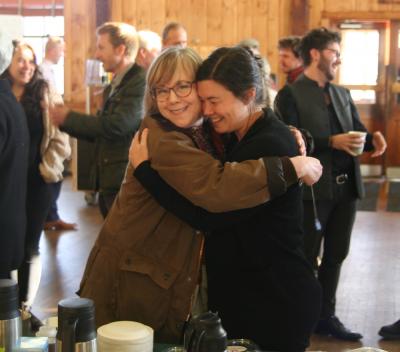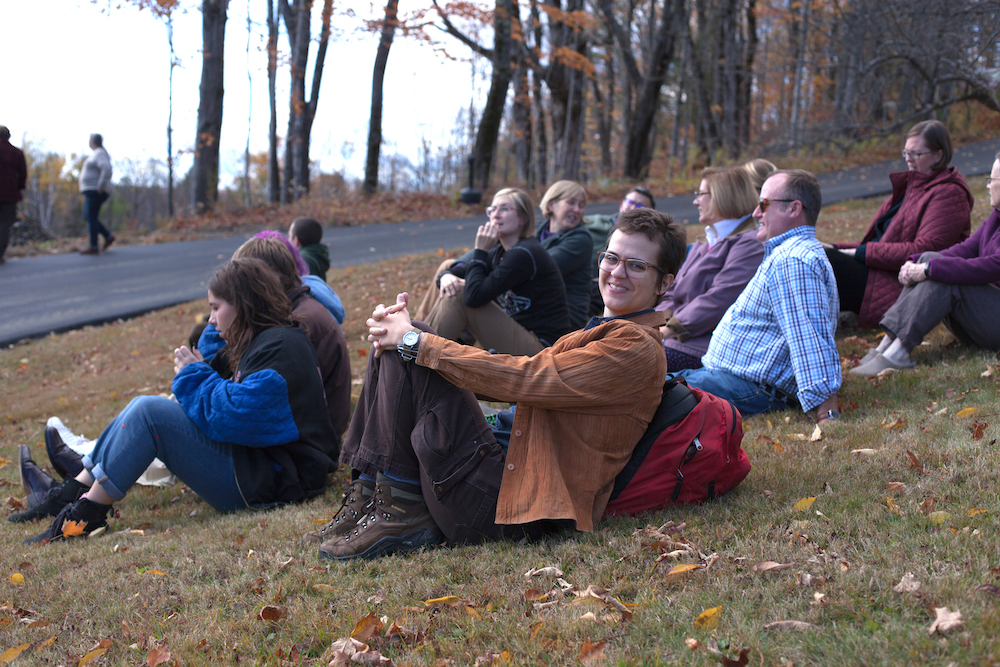Working Groups Get Down to Details

Following quickly on the announcement of Marlboro’s alliance with Emerson College, working groups were formed to consider options and advocate solutions for key constituencies and interests, including students, faculty, staff, and the future of the campus. Most working groups took advantage of committees already engaged in advocating for these groups, and included trustees, faculty, staff, students, and, in the case of the campus working group, alumni. The student working group has the goal of charting the smoothest possible transition for students to Emerson or another institution of their choice, and of aligning student data with Emerson’s systems.
The group is made up of the Dean’s Advisory Committee as well as Dean of Students Patrick Connelly, Dean of Admissions Fumio Sugihara, trustee and parent Susan Wefald, Director of Financial Aid Kristin Hielmenski, Registrar Cathy Fuller, IT Director Michael Riley ’09, and religion professor Amer Latif.
“We arranged four listening sessions with students in November and December, to allow students to voice their opinion regarding the proposed alliance and answer any questions,” said Patrick, who held the sessions. “They were well received, and helped lessen student anxiety about the alliance.” Student Life has increased social programming and events on campus in order to engage students in a healthy and productive way, and added additional counselors to the Total Health Center to support students feeling challenged by their next steps.
The working group has helped orchestrate visits between Marlboro students and Emerson staff and students (see page 20), and provided information about housing and financial aid to students and families transitioning to Emerson. In January the college announced that it would cover the difference in housing costs for students going on to Emerson, removing a huge barrier for many students. The working group has also supported the negotiation of transfer options with four other institutions—College of the Atlantic, Bennington College, Castleton University, and Saint Michael’s College— waiving application fees and other transfer requirements and offering comparable financial aid.
“We understand students have various preferences and needs in meeting their academic goals, and that for some students transferring to an institution other than Emerson may be their best path forward,” said Fumio. “Admissions will support any student interested in transferring to an institution other than the Marlboro Institute at Emerson.” The college has agreed to pay application fees for students transferring to other, non-partnered colleges.
The working group on faculty includes members of the Committee on Faculty, Curriculum Committee, and faculty and students from the Strategic Options Task Force, as well as Provost and Dean of Faculty Richard Glejzer and trustee Donna Heiland. This group has the task of clarifying curricular requirements for students and developing an advising program for transition to Emerson. Working with their counterparts at Emerson, they have been building a four-year program that incorporates significant aspects of Marlboro’s curriculum, including an emphasis on writing and individualized study that will draw upon Marlboro’s tutorial model.
“It has been heartening to see how Emerson faculty eagerly welcome the expertise of Marlboro faculty in designing and implementing a new four-year degree program that includes individualized study,” says Richard. “Marlboro faculty have been driving the conversation on the curriculum, while learning from their counterparts about Emerson students and the spaces they will be working in.” The working group presented a proposal to Emerson in February, which then needs to work its way through Emerson’s governance structure for final approval.
The working group on staff has the task of stewarding the staff through the transition, and supporting staff well-being during what is admittedly a difficult time. This group is made up of the Committee on Staff and the Benefits Committee, and also includes COO Becky Catarelli and trustee and alumni parent Kirsten Malone.

Based on the advocacy of this group, in December the board of trustees unanimously approved a severance policy for staff that was considered generous by almost any measure. The group has also been actively finding ways to support staff in terms of placement in other jobs after the Marlboro campus closes.
“We are thrilled with the unstinting severance policy adopted by the trustees, and it was only made possible by the vigilance of this group,” says Becky. “We realize that, of all constituents, the staff is most affected by this alliance and want them to know that we are doing all we can to soften the blow.”
Perhaps the group that has attracted the most attention and interest of other constituencies, including alumni and Marlboro townspeople, is the campus working group. The group is chaired by two alumni, Sara Coffey ’10 and Dean Nicyper ’76, and includes faculty, staff, and students as well as Alumni Council member Randy George ’93, Marlboro Town Selectman Jesse Kreitzer, and trustees Dick Saudek and Phil Steckler.
In an email to members of the working group, Sara Coffey, a Vermont state representative who served on the board of trustees for several years, said “Each of us has a deep connection to the college, and we know many of us are feeling a great loss, so this is a challenging task, but a very important one. The aim of this working group is to develop a process for gathering community input and proposals for the future use of the Marlboro College campus.”
“It sounds really simple, but as you can imagine, all the different factors that are involved in what happens on campus make it very complex,” says Nikolas Katrick ’07, MSM’16, Outdoor Program director and one of the staff representatives. “We’re trying to find great proposals that can utilize this campus and also possibly mesh together with other proposals. Anybody can submit proposals, but the working group isn’t going to workshop someone’s idea and make it viable. We don’t have the capacity to do that.”
Specifically, the working group has invited proposals for ownership and use of the Marlboro campus that will provide a significant benefit to the Marlboro community and result in a payment consistent with the campus fair market value. Any proposal must also be consistent with the terms of the Marlboro Music Festival lease and any amendments. The plan is to present the most viable proposals for review and approval by the Marlboro board of trustees, or by Emerson if they are presented after the merger.
“We have heard of widespread interest from various groups who are interested in finding some way to continue to have a managed trail network and preserve the Marlboro College Ecological Reserve,” says Sara. “These will be considerations as we move forward.” Each working group member has been collecting proposals from their respective constituents, and coordinating with state officials and counterparts at Emerson as necessary.
For more information about submitting a proposal, visit marlboro.edu/CWG. Proposals will be reviewed on a rolling basis and will be held in the strictest confidence.
